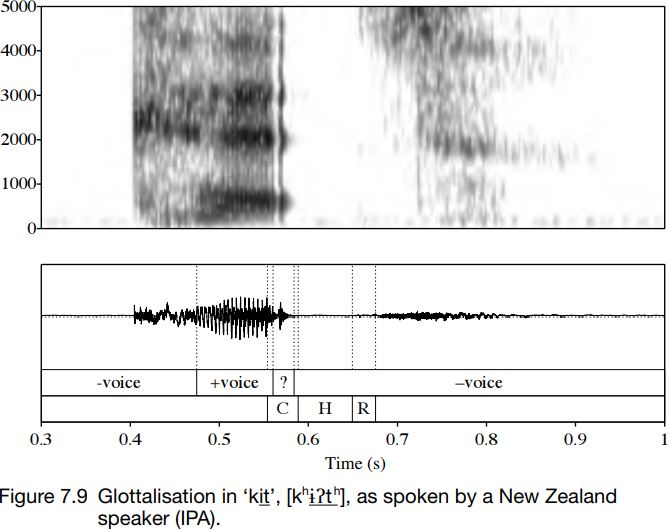


 Grammar
Grammar
 Tenses
Tenses
 Present
Present
 Past
Past
 Future
Future
 Parts Of Speech
Parts Of Speech
 Nouns
Nouns
 Verbs
Verbs
 Adverbs
Adverbs
 Adjectives
Adjectives
 Pronouns
Pronouns
 Pre Position
Pre Position
 Preposition by function
Preposition by function 
 Preposition by construction
Preposition by construction
 Conjunctions
Conjunctions
 Interjections
Interjections
 Grammar Rules
Grammar Rules
 Linguistics
Linguistics
 Semantics
Semantics
 Pragmatics
Pragmatics
 Reading Comprehension
Reading Comprehension|
Read More
Date: 2023-12-08
Date: 2023-09-25
Date: 2023-08-15
|
Closures of voiceless plosives [p t k] and the affricate [tʃ] are often accompanied by glottalisation. This involves the adduction of the vocal folds usually before the oral closure is made. If complete, the adduction results in a glottal stop; if incomplete, there is a portion of creaky voice. Both of these give an auditory impression of the vowel being cut short. This is often called ‘glottal reinforcement’.
Glottalisation is limited to syllable-final voiceless plosives.
Figure 7.9 shows a New Zealand speaker’s production of the vowel + plosive portion the word ‘kit’, with glottal reinforcement. There is a short portion between the segments labelled [+voice] and [–voice] where there is a glottal stop (labelled [?]): in the spectrogram, it shows up as an irregular and distinct vertical striation.
with glottal reinforcement. There is a short portion between the segments labelled [+voice] and [–voice] where there is a glottal stop (labelled [?]): in the spectrogram, it shows up as an irregular and distinct vertical striation.


On the waveform, notice the similarly abrupt pulse during that segment; the amplitude drops away more abruptly than in other vowel-to-plosive transitions that we have seen. This abrupt ending to the vowel gives the impression of it having been cut short: voiceless plosives in English are regularly preceded by shorter vowels than voiced plosives, so glottalisation enhances the percept of ‘shortness’.
Glottalisation is especially common with alveolar closure, and sometimes even replaces alveolar closure, when it is known as ‘glottal replacement’. It is less common in conjunction with bilabial or dorsal closure, though there are varieties of English where bilabial and dorsal closure can be replaced by just glottal closure, as in Cockney  for ‘a cup of tea’.
for ‘a cup of tea’.
|
|
|
|
للعاملين في الليل.. حيلة صحية تجنبكم خطر هذا النوع من العمل
|
|
|
|
|
|
|
"ناسا" تحتفي برائد الفضاء السوفياتي يوري غاغارين
|
|
|
|
|
|
|
بمناسبة مرور 40 يومًا على رحيله الهيأة العليا لإحياء التراث تعقد ندوة ثقافية لاستذكار العلامة المحقق السيد محمد رضا الجلالي
|
|
|